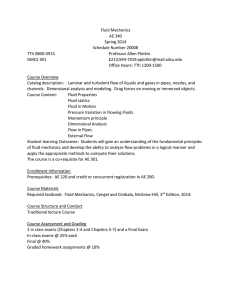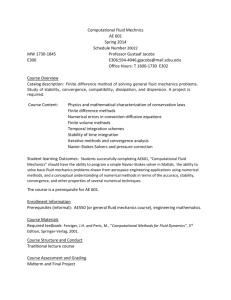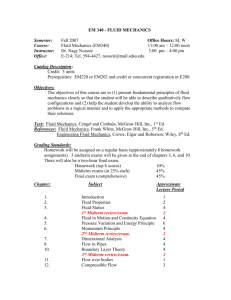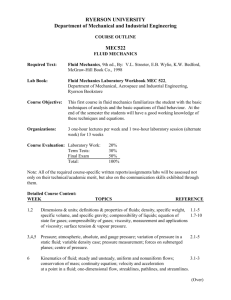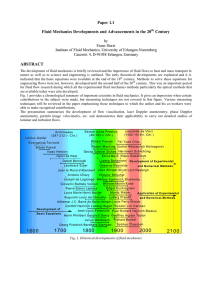Mechanical Engineering and Mechanics MEM 220 Basic Fluid Mechanics Analysis I
advertisement
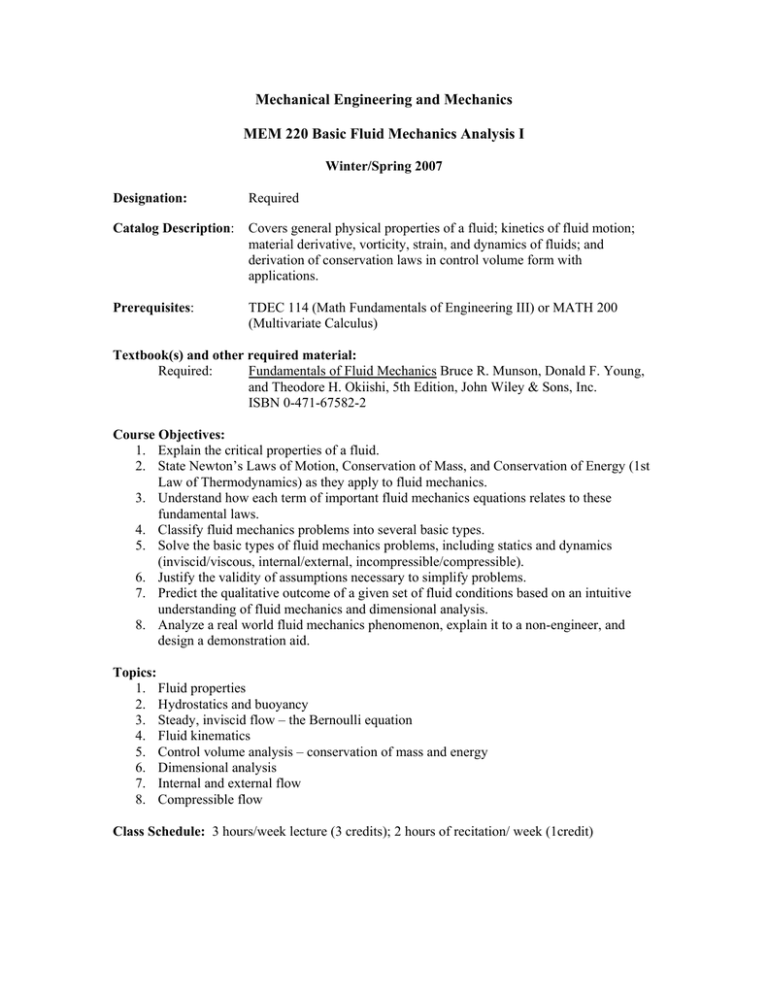
Mechanical Engineering and Mechanics MEM 220 Basic Fluid Mechanics Analysis I Winter/Spring 2007 Designation: Required Catalog Description: Covers general physical properties of a fluid; kinetics of fluid motion; material derivative, vorticity, strain, and dynamics of fluids; and derivation of conservation laws in control volume form with applications. Prerequisites: TDEC 114 (Math Fundamentals of Engineering III) or MATH 200 (Multivariate Calculus) Textbook(s) and other required material: Required: Fundamentals of Fluid Mechanics Bruce R. Munson, Donald F. Young, and Theodore H. Okiishi, 5th Edition, John Wiley & Sons, Inc. ISBN 0-471-67582-2 Course Objectives: 1. Explain the critical properties of a fluid. 2. State Newton’s Laws of Motion, Conservation of Mass, and Conservation of Energy (1st Law of Thermodynamics) as they apply to fluid mechanics. 3. Understand how each term of important fluid mechanics equations relates to these fundamental laws. 4. Classify fluid mechanics problems into several basic types. 5. Solve the basic types of fluid mechanics problems, including statics and dynamics (inviscid/viscous, internal/external, incompressible/compressible). 6. Justify the validity of assumptions necessary to simplify problems. 7. Predict the qualitative outcome of a given set of fluid conditions based on an intuitive understanding of fluid mechanics and dimensional analysis. 8. Analyze a real world fluid mechanics phenomenon, explain it to a non-engineer, and design a demonstration aid. Topics: 1. Fluid properties 2. Hydrostatics and buoyancy 3. Steady, inviscid flow – the Bernoulli equation 4. Fluid kinematics 5. Control volume analysis – conservation of mass and energy 6. Dimensional analysis 7. Internal and external flow 8. Compressible flow Class Schedule: 3 hours/week lecture (3 credits); 2 hours of recitation/ week (1credit) Contribution to Professional Component: Contributes toward the 1 ½ year of engineering topics appropriate to developing the ability to work in the thermofluid systems area. Prepares students for classes in thermofluid system design. Relationship to Program Outcomes: Outcomes a - k a. An ability to apply knowledge of mathematics, science and engineering b. An ability to design and conduct experiments as well as to analyze and interpret data c. An ability to design a system, component or process to meet desired needs d. An ability to function on multidisciplinary teams e. An ability to identify, formulate and solve engineering problems Content Explanation 2 Students will use their skills in math, physics, chemistry and introductory engineering courses to develop qualitative and quantitative frameworks for fluid mechanics. 1 Students will collect and analyze data in class and recitations for fluid mechanics phenomena. 2 Students will design and build solutions to fluid mechanics problems given realistic constraints. 0 NA 2 f. An understanding of professional and ethical responsibility 1 g. An ability to communicate effectively 2 h. The broad education necessary to understand the impact of engineering solutions in a global/societal context i. A recognition of the need for and an ability to engage in lifelong learning j. A knowledge of contemporary issues 1 k. An ability to use the techniques, skills and modern engineering tools necessary for engineering practice 1 Prepared by: 1 1 Students will learn to classify, simplify, and solve a variety of fluid mechanics problems. Professional responsibility will be emphasized in class and in the project presentation. Students will present their final project to an audience of nonengineers. Students will discuss societal context in class and may choose to address such issues in the final project. Students will identify, analyze, and explain an applied problem of interest. Students will analyze classic fluid mechanics problems in a contemporary context. Students may explore the use of computer simulations and physical modeling to relate fluid mechanics concepts. Dr. Alisa S. Morss, 13 November 2006 Evidence Homework, exams, final project Class demonstrations; final project Final project, homework, exams NA Homework, exams, final project Classroom discussion, final project Homework, exams, final project Classroom discussion; Final project Final project Classroom discussion, homework, exams, final project Final project
